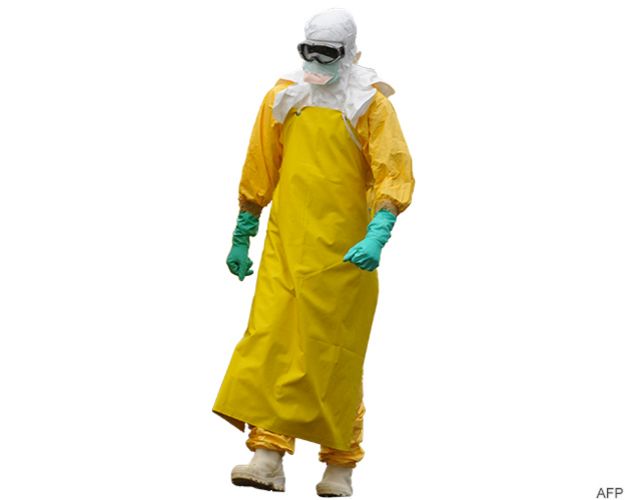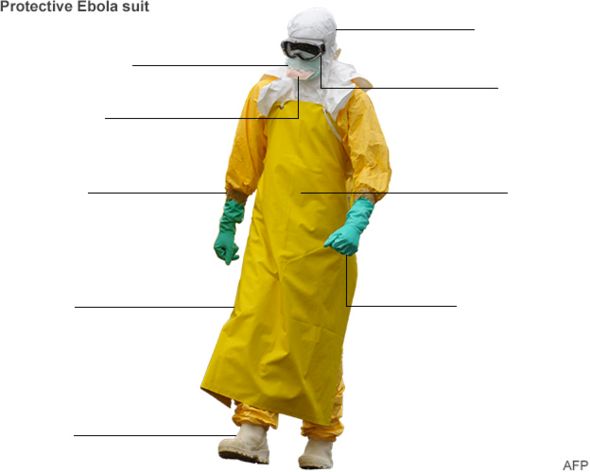
Accessibility links
13 October 2014
Last updated at 12:22 GMT
The National Health Workers Association wants an increase in the monthly risk fee paid to those treating Ebola cases.
Liberia is worst-affected by the deadliest ever Ebola outbreak.
The disease has killed more than 4,000 people in Liberia, Sierra Leone, Guinea and Nigeria since it was identified in March.
World Health Organization (WHO) Director-General Margaret Chan said the outbreak threatened the "very survival of societies and governments in already very poor countries".
 More than 4,000 people have died during the Ebola outbreak
More than 4,000 people have died during the Ebola outbreak
 The home of a US health worker infected with Ebola is disinfected
"I have never seen an infectious disease contribute so strongly
to potential state failure," she said in a speech delivered on her
behalf at a health conference in the Philippines.
The home of a US health worker infected with Ebola is disinfected
"I have never seen an infectious disease contribute so strongly
to potential state failure," she said in a speech delivered on her
behalf at a health conference in the Philippines.
In the US, President Barack Obama has directed more steps to be taken to ensure high safety procedures when dealing with suspected Ebola patients after a health worker treating an Ebola victim caught the virus.
'Negative consequences' In Liberia, 95 health workers have so far died from Ebola, and the National Health Workers Association has accused the government of not doing enough to protect them.
The association called the strike to demand a risk fee of $700 (£434) a month; it is currently less than $500 a month, on top of basic salaries of between $200-$300.
 Ebola deaths: Confirmed, probable and suspected
Ebola deaths: Confirmed, probable and suspected
 Source: WHO
Source: WHO
Note: figures have occasionally been revised down as suspected or probable cases are found to be unrelated to Ebola. They do not include one death in the US recorded on 8 October.
 How not to catch Ebola:
How not to catch Ebola:
How Ebola attacks
Ebola: Mapping the outbreak
 The association's secretary-general George Williams said the
government had pressured some health staff to report to work, but he was
still assessing whether the call for a strike was effective.
The association's secretary-general George Williams said the
government had pressured some health staff to report to work, but he was
still assessing whether the call for a strike was effective.
Earlier, Liberia's Assistant Health Minister Tolbert Nyenswah said a strike would have negative consequences on those suffering from Ebola and would adversely affect progress made so far in the fight against the disease.
The government says the scale of the epidemic means it now cannot afford the risk fee originally agreed.
'Full inquiry' Liberia has about 50 doctors to serve the country's 4.2 million people - an average of 0.1 doctor per 10,000 people, according to data compiled by the Afri-Dev.Info health and social development agency.
A new UN centre to co-ordinate the fight against the epidemic is being set up in Ghana and UN aid workers and logisticians are being flown to the capital, Accra.
Ghana has not been hit by Ebola.
Six months after the epidemic began in West Africa there are still only about a quarter of the treatment beds required to tackle it.
Food is now in short supply as markets are disrupted in some parts of the three countries worst affected: Liberia, Sierra Leone and Guinea.
In Liberia, elections have been postponed because the gathering of people at polling stations would endanger lives.
On Sunday evening, the US Centers for Disease Control and Prevention (CDC) confirmed that a female health worker had tested positive for Ebola in Dallas.
CDC chief Dr Tom Frieden has promised a full inquiry into how the transmission could have occurred.
The CDC investigation, he told reporters, would focus on possible breaches made during two "high-risk procedures", dialysis and respiratory intubation.
The health worker at Texas Health Presbyterian Hospital had been treating Ebola victim Thomas Eric Duncan, who caught the virus in his native Liberia and died on Wednesday.
 Continue reading the main story
Continue reading the main story

Ebola: Some Liberian health workers defy strike call
Many health workers have died from Ebola in Liberia
Some health workers in Liberia have turned up for work, defying calls for a strike amid the Ebola outbreak, a BBC reporter says.
However, the picture is still unclear, as there are also
reports of workers heeding the strike call, the BBC's Jonathan
Paye-Layleh in Liberia says.The National Health Workers Association wants an increase in the monthly risk fee paid to those treating Ebola cases.
Liberia is worst-affected by the deadliest ever Ebola outbreak.
The disease has killed more than 4,000 people in Liberia, Sierra Leone, Guinea and Nigeria since it was identified in March.
World Health Organization (WHO) Director-General Margaret Chan said the outbreak threatened the "very survival of societies and governments in already very poor countries".
 More than 4,000 people have died during the Ebola outbreak
More than 4,000 people have died during the Ebola outbreak
 The home of a US health worker infected with Ebola is disinfected
The home of a US health worker infected with Ebola is disinfected
In the US, President Barack Obama has directed more steps to be taken to ensure high safety procedures when dealing with suspected Ebola patients after a health worker treating an Ebola victim caught the virus.
'Negative consequences' In Liberia, 95 health workers have so far died from Ebola, and the National Health Workers Association has accused the government of not doing enough to protect them.
The association called the strike to demand a risk fee of $700 (£434) a month; it is currently less than $500 a month, on top of basic salaries of between $200-$300.

Note: figures have occasionally been revised down as suspected or probable cases are found to be unrelated to Ebola. They do not include one death in the US recorded on 8 October.
- Avoid direct contact with sick patients
- Wear goggles to protect eyes
- Clothing and clinical waste should be incinerated and any medical equipment that needs to be kept should be decontaminated
- People who recover from Ebola should abstain from sex or use condoms for three months
How Ebola attacks
Ebola: Mapping the outbreak
Earlier, Liberia's Assistant Health Minister Tolbert Nyenswah said a strike would have negative consequences on those suffering from Ebola and would adversely affect progress made so far in the fight against the disease.
The government says the scale of the epidemic means it now cannot afford the risk fee originally agreed.
'Full inquiry' Liberia has about 50 doctors to serve the country's 4.2 million people - an average of 0.1 doctor per 10,000 people, according to data compiled by the Afri-Dev.Info health and social development agency.
A new UN centre to co-ordinate the fight against the epidemic is being set up in Ghana and UN aid workers and logisticians are being flown to the capital, Accra.
Mark Doyle reports on a new UN centre co-ordinating cases in Ghana
Six months after the epidemic began in West Africa there are still only about a quarter of the treatment beds required to tackle it.
Food is now in short supply as markets are disrupted in some parts of the three countries worst affected: Liberia, Sierra Leone and Guinea.
In Liberia, elections have been postponed because the gathering of people at polling stations would endanger lives.
On Sunday evening, the US Centers for Disease Control and Prevention (CDC) confirmed that a female health worker had tested positive for Ebola in Dallas.
CDC chief Dr Tom Frieden has promised a full inquiry into how the transmission could have occurred.
The CDC investigation, he told reporters, would focus on possible breaches made during two "high-risk procedures", dialysis and respiratory intubation.
The health worker at Texas Health Presbyterian Hospital had been treating Ebola victim Thomas Eric Duncan, who caught the virus in his native Liberia and died on Wednesday.
Alastair Leithead, outside the hospital, said the investigation is on-going
INTERACTIVE
-
Protective Ebola suit
×
-
Surgical cap
×The cap forms part of a protective hood covering the head and neck. It offers medical workers an added layer of protection, ensuring that they cannot touch any part of their face whilst in the treatment centre.
-
Goggles
×Goggles, or eye visors, are used to provide cover to the eyes, protecting them from splashes. The goggles are sprayed with an anti-fogging solution before being worn.
-
Medical mask
×Covers the mouth to protect from sprays of blood or body fluids from patients. When wearing a respirator, the medical worker must tear this outer mask to allow the respirator through.
-
Respirator
×A respirator is worn to protect the wearer from a patient's coughs. According to guidelines from the medical charity Medecins Sans Frontieres (MSF), the respirator should be put on second, right after donning the overalls.
-
Medical Scrubs
×A surgical scrub suit, durable hospital clothing that absorbs liquid and is easily cleaned, is worn as a baselayer underneath the overalls. It is normally tucked into rubber boots to ensure no skin is exposed.
-
Overalls
×The overalls are placed on top of the scrubs. These suits are similar to hazardous material (hazmat) suits worn in toxic environments. The team member supervising the process should check that the equipment is not damaged.
-
Double gloves
×A minimum two sets of gloves are required, covering the suit cuff. When putting on the gloves, care must be taken to ensure that no skin is exposed and that they are worn in such a way that any fluid on the sleeve will run off the suit and glove. Medical workers must change gloves between patients, performing thorough hand hygiene before donning a new pair. Heavy duty gloves are used whenever workers need to handle infectious waste.
-
Apron
×A waterproof apron is placed on top of the overalls as a final layer of protective clothing.
-
Boots
×Ebola health workers typically wear rubber boots, with the scrubs tucked into the footwear. If boots are unavailable, workers must wear closed, puncture and fluid-resistant shoes.

